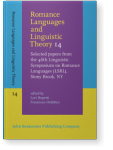Chapter 14
Causativization of verbs of directed motion in Romance languages
The purpose of this paper is to shed light on a particular behavior displayed by verbs of inherently directed motion, the availability of a causative transitive alternate, and how this phenomenon interacts with the presence of clitic se in the intransitive variant. Data from Catalan, Aragonese and Italian varieties, none of which have received much attention in the literature, will prove crucial for our proposal. We adopt an inter-Romance perspective and a nanosyntactic approach to lexicalization in order to refine the correlation Jiménez-Fernández and Tubino (2014, 2017) find for Spanish, where inherently directional motion verbs are claimed to be more easily causativized (entrar el coche ‘go in the car’) in varieties where the use of se in the intransitive forms is also more frequent (Juan se entró ‘Juan se went in’).
Article outline
- 1.Introduction
- 2.Causative DM verbs
- 2.1Causativized DM verbs Catalan
- 2.2Causativized DM verbs in Italian
- 2.3Causativized DM verbs in Aragonese
- 2.4Causativized DM verbs in Spanish
- 3.What does a verb need to be causativized?
- 3.1Pronominal DM verbs in (varieties of) Catalan
- 3.2Pronominal DM verbs in (varieties of) Italian
- 3.3Pronominal DM verbs in (varieties of) Aragonese
- 4.Proposal
- 4.1What is ne?
- 4.2Same structure, different lexicalization
- 5.Conclusions
-
Acknowledgements
-
Notes
-
References
References (34)
References
Alvar, Manuel. 1953. El dialecto aragonés. Madrid: Gredos.
Andriani, Luigi. 2011. “Differential Object Marking, Clitic Doubling and Argument Structure in Barese.” M.A. thesis, Leiden University.
Arnal Purroy, María Luisa. 1998. El habla de la Baja Ribagorza occidental: aspectos fónicos y gramaticales. Zaragoza: Institución “Fernando el Católico”.
Badia i Margarit, Antoni Maria. 1994. Gramàtica de la llengua catalana. Descriptiva, normativa, diatòpica i diastràtica. Barcelona: Enciclopèdia Catalana.
Basilico, David. 2010. “The se clitic and its relationship to paths.” Probus 22: 271–302.

Blinkenberg, Andreas. 1960. Le problème de la transitivité en français moderne. Kobenhavn: Ejnar Munksgaard.
De Miguel, Elena. 1999. “El aspecto léxico.” In Gramática descriptiva de la lengua española, ed. by Ignacio Bosque, and Violeta Demonte, vol. 2, 2977–3060. Madrid: Espasa-Calpe.
De Miguel, Elena, and Marina Fernández Lagunilla. 2000. “El operador aspectual ‘se’.” Revista española de lingüística 30: 13–44.
Folli, Raffaella, and Heidi Harley. 2005. “Flavours of v: Consuming Results in Italian and English.” In Aspectual Inquiries, ed. by Paula Kempchinsky, and Roumyana Slabakova, 95–120. Dordrecht: Springer.

Giralt, Javier. 1995. “Valors i funcions d’ibiiinde als parlars lliterans.” Alazet 7: 57–74.
Gràcia, Lluïsa. 1989. Els verbs ergatius en català. Maó: Institut Menorquí d’Estudis.
Jiménez-Fernández, Ángel, and Mercedes Tubino, 2014. “Variación sintáctica en la causativización léxica.” RSEL 44 (1): 7–37.
Jiménez-Fernández, Ángel, and Mercedes Tubino. 2017. “Causativity in Southern Peninsular Spanish.” In The Syntactic Variation of Spanish Dialects, ed. by Ángel Gallego. Oxford: Oxford University Press.
Ledgeway, Adam. 2000. A Comparative Syntax of the Dialects of Southern Italy: A Minimalist Approach. Oxford: Blackwell.
Ledgeway, Adam. 2009. Grammatica diacronica del napoletano. Tübingen: Max Niemeyer Verlag.

Llorente Maldonado, Antonio. 1980. “Consideraciones sobre el español actual.” Anuario de Letras XVIII: 5–61.
Martín Zorraquino, M. Antonia. 1979. Las construcciones pronominales en español. Madrid: Gredos.
Masullo, Pascual José. 1992. “Incorporation and case theory in Spanish. A cross-linguistic perspective.” Ph.D. dissertation, University of Washington.
Moll, Francesc de Borja. 1990 [1968]. Gramática catalana referida especialmente a les Illes Balears. Palma de Mallorca: Moll.
Nagore Lain, Francho. 1986. El aragonés de Panticosa. Gramática. Huesca: Diputación Provincial.
Nishida, Chiyo. 1994. “The Spanish reflexive clitic se as an aspectual class marker.” Linguistics 23: 425–458.
Pineda, Anna. To appear. “The role of SE and NE in Romance verbs of directed motion. Evidence from Catalan, Italian, Aragonese and Spanish varieties.” In Proceedings from the Workshop on Romance Se-Si, ed. by Grant Armstrong, and Jonathan MacDonald.
Rohlfs, Gerhard. 1954a. Grammatica storica della lingua italiana e dei suoi dialetti. Vol. 1. Morfologia. Torino: Einaudi.
Rohlfs, Gerhard. 1954b. Grammatica storica della lingua italiana e dei suoi dialetti. Vol. 2. Sintassi e formazione delle parole. Torino: Einaudi.
Sánchez López, Cristina. 2002. “Las construcciones con se. Estado de la cuestión.” In Las construcciones con se, ed. by Cristina Sánchez López, 13–163. Madrid: Visor Libros.
Sanchis Guarner, Manuel. 1950. Gramàtica valenciana. València: Torre.
Schäfer, Florian. 2012. “Two Types of External Argument Licensing – The Case of Causers.” Studia Linguistica 66 (2): 1–53.

Schroten, Jan. 1972. Concerning the Deep Structure of Spanish Reflexive Sentences. The Hague: Janua Linguarum.
Solà, Joan. 1994. Sintaxi normativa: estat de la qüestió. Barcelona: Empúries.
Todolí, Júlia. 1990. “Les funcions pronominals en el català del País Valencià.” Miscel·lània Joan Bastardas 4, 253–261.
Todolí, Júlia. 2002. “Els pronoms.” In Gramàtica del català contemporani, ed. by Joan Solà, Maria-Rosa Lloret, Joan Mascaró, and Manuel Pérez Saldanya, vol. 2, 1337–1433. Barcelona: Empúries.
Zagona, Karen. 1996. “Compositionality of Aspect: Evidence from Spanish Aspectual se
.” In Aspects of Romance Linguistics, ed. by Claudia Parodi, 475–488. Washington, DC: Georgetown University Press.
Cited by (1)
Cited by one other publication
Pineda, Anna
2021.
The Role of SE and NE in Romance Verbs of Directed Motion: Evidence from Catalan, Italian, Aragonese and Spanish Varieties. In
Unraveling the complexity of SE [
Studies in Natural Language and Linguistic Theory, 99],
► pp. 265 ff.

This list is based on CrossRef data as of 27 july 2024. Please note that it may not be complete. Sources presented here have been supplied by the respective publishers.
Any errors therein should be reported to them.
